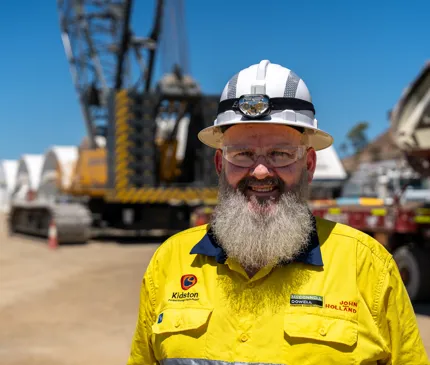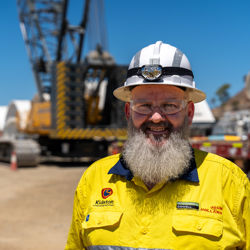Sean Hughes talks about Indigenous employment success at the Kidston Hydro Project
Sean Hughes shares how Kidston Hydro surpassed Indigenous employment goals, driving real benefits for Indigenous workers, businesses, and communities.

The McConnell Dowell John Holland Joint Venture has achieved notable success in Indigenous engagement and employment at the Genex Kidston Pumped Storage Hydro project, surpassing targets for Indigenous participation in major construction initiatives. The project's innovative "Meals on Tables" approach has delivered sustainable employment outcomes and created lasting positive impacts for Indigenous communities in North Queensland.
Under the leadership of Procurement Manager Sean Hughes, the project has achieved an exceptional Indigenous workforce participation rate of 9.4% during construction of the renewable energy project, significantly exceeding their employment targets. This success stems from the implementation of a comprehensive Indigenous Engagement Strategy (IES) that prioritises Indigenous employment and genuine community benefits.
"We focused on creating real opportunities that would translate to financial stability for Indigenous workers and their families," explains Hughes. "Our 'Meals on Tables' philosophy helped us break down complex challenges into practical solutions that delivered tangible benefits to Indigenous communities."

Sean Hughes
Procurement Manager, McConnell Dowell John Holland Joint Venture
As part of their early engagement with the Ewamian people, Genex Power committed $536,500 to support the development of the Talaroo Hot Springs Tourism Development Plan, a community-led initiative that brings together the rich cultural heritage of the Ewamian people with one of outback Queensland’s most unique natural attractions. Set in the heart of the Gulf Savannah, Talaroo’s striking terraces, vivid geothermal pools, and dramatic landscapes form the backdrop for a visitor experience grounded in Aboriginal storytelling and hospitality.
Beyond tourism, Genex’s partnership with the Ewamian Aboriginal Corporation has also delivered significant economic benefits. To date, the project has generated more than $7.5 million in procurement contracts for Indigenous-owned businesses, including Australian Training Works, Ewamian Aboriginal Corporation, and Giidja Industries. It’s a tangible outcome of early collaboration and one that’s creating jobs, building capacity, and laying the foundation for long-term community benefit.
The project implemented several innovative initiatives to achieve these outcomes:
- Early engagement with Traditional Owners the Ewamiam people and the Ewamiam Aboriginal Corporation
- Established partnerships with group training organisations to facilitate traineeships and apprenticeships
- Engagement with over 100 contractors through industry briefings in Townsville
- Implementation of a school outreach program to create career pathways
- Development of specialised roles, including an underground trades assistant program with a comprehensive certification
This showed their commitment to sustainable outcomes for Indigenous workers and businesses by developing a comprehensive support structure:
- Provision of wrap-around support services through partnership with Australian Training Works
- Financial literacy, social and emotional wellbeing guidance for employees
- Dedicated mentoring and coaching programs
- Cultural awareness initiatives integrated into project operations
"The results have exceeded our expectations," Hughes notes. "Many of our Indigenous employees have transitioned from unemployment or school to stable, well-paying careers.
They've not only stayed the course but have excelled in their roles, despite the challenges of adapting to a construction environment and FIFO work arrangements."
For organisations considering similar Indigenous engagement initiatives, Hughes emphasises the importance of genuine commitment.
"Success requires more than just checking boxes. You need to understand your objectives clearly and be prepared to invest in proper support structures. The results we've achieved here are unprecedented in my 15 years of construction experience."
At NAIF, all proponents who secure project finance are required to develop and report on an Indigenous Engagement Strategy. Our proponents understand that the conditions of our finance is not a matter of ticking a box, but ensuring every project we support delivers real benefits to Indigenous communities. What Genex, along with Sean Hughes and the team at McConnell Dowell John Holland Joint Venture have achieved at the Kidston Pumped Storage Hydro Project, shows the kind of impact that’s possible when this is done properly. Their approach has helped Indigenous businesses grow, and opened up new career pathways for Indigenous workers, many of whom are now building stronger futures for themselves, their families, and their communities.
It’s outcomes like these where families attain greater financial stability and workers gain new skills and opportunities that show why Indigenous Engagement Strategies matter, and why we’re committed to putting these priorities at the core of how we invest in infrastructure development in northern Australia.
Find out more about the Kidston Pumped Storage Hydro Project


